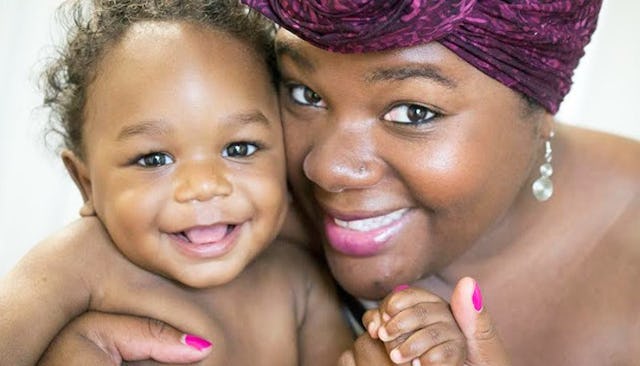Representation Matters: Finding The Support I Needed As A Black Mom

“Right here?” I stuttered.
“Yeah. Why not?”
To my left, my father-in-law was enjoying a plate of scrambled eggs. To my right, my husband was cutting up a waffle for my daughter. I looked down at my 4-day-old baby boy. I smoothed my thumb over his tiny-fisted hand and took a deep breath. In front of me, my mother glared at me.
The pressure. So much pressure.
Between my throbbing uterus, sore nipples, and the onslaught of postpartum emotions, I was finding that eating out with the family just days after I had given birth just wasn’t a good idea.
“You sure?” my husband asked through sips of coffee.
“Yeah,” I said. “I’ll be fine.”
I grabbed the baby bag, gently plopped my baby in the carrier, and made my way out of the restaurant. Tears flooded my eyes, and I angry-texted my best friend as I made my way to the car in the crisp November air.
I was failing at breastfeeding in public, and I was mad about it.
Brittany Minor
I was four days postpartum, and breastfeeding was already consuming every bit of my soul. That’s the thing about nursing a baby. I don’t care what these books say. Lactation consultants are great, but really no one and nothing can prepare you for the struggles and joys, the beauty and horror, and the ups and downs of putting your boob in a baby’s mouth over and over again.
This was my second baby. You’d think I would have this down, right? Pfft, nope. With my oldest, after an unsuccessful nursing relationship, I found myself exclusively pumping. That breast pump saw more of my boobs than my husband did. I pumped in airports, conference rooms, hotels, cars, lobbies, and offices. I did it for a good year and some change, and when I was pregnant with my son, I wanted nothing more than to be able to nurse him.
That 7-pound little guy was born at home and with a supportive midwife and her assistant, and he suckled like a champ. To ease my nerves, the day after he was born I made my way to a lactation consultant. And not just any lactation consultant — a black one. You see, this part was important. Having met with several lactation consultants before, I wanted a different experience. I wanted to speak to someone who looked like me.
Layla came highly recommended from my midwife and her staff, and she felt like a sister-friend when she invited me, my husband, and newborn back into her office.
“My boobs are really big,” I tell her.
She laughs.
“And my nipples are weird too. They’re flat.”
She laughs again and directs me to get in a comfortable position with my sleeping baby.
“I don’t even know if I can do this. I couldn’t with my daughter.”
“Girl, stop. None of those negative vibes up in here.”
We chatted. She gently coached me. She snuggled my baby. She dropped hints. When my husband left the room to get the diaper bag, she showed me her breasts. They looked just like mine. The same breasts that nursed her four babies. They looked just like mine. And okay, so it sounds strange that looking at another woman’s breasts gave me hope, but it did. She told me that if she was able to nurse, I would be able to nurse.
Here we are nine months later, and I’ve been nursing this baby, pumping when I’m away from him, juggling his demands and a preschooler’s craziness, and working while sleep-deprived. I flashback to when I first tried to nurse him in a restaurant and laugh at that memory because now I can nurse him almost effortlessly in public and at home.
Brittany Minor
Representation matters. Sometimes you really have to see it to believe it. And as a black mama breastfeeding, seeing a lactation consultant who looked like me changed the game.
My hope is that when mamas like me — black mamas, mamas with big boobs, mamas with imperfect nipples and apprehension — express frustration, they find support.
And if I ever personally know a mama in that exact situation, I will not hesitate to whip off my shirt and show her my rack in hopes of encouraging her and letting her know that if my breasts were able to provide nourishment for my babies, her breasts can do the same.
August 25 to 31 marks the sixth annual Black Breastfeeding Week. To learn more, visit blackbreastfeedingweek.org.
This article was originally published on